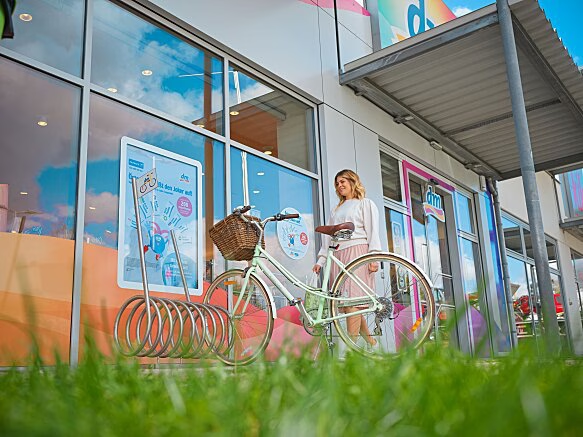First joint sustainability report for all 14 dm countries.

A few days ago, the report on future viability for the 2023/24 financial year – the sustainability report of dm drogerie markt – was published in Austria. For the first time, it summarizes the sustainable activities of all 14 national organizations of the dm Group in order to positively shape the future as an economic community.
"The entire cross-border project team was guided by the idea that the report was not just a bureaucratic obligation, but a meaningful one: The transparency created helps us identify key areas of action and implement even more targeted measures. And it makes visible how many valuable and unique projects are underway in all dm countries. This motivates people in all areas of the company to want to do even better," emphasizes Harald Bauer, CEO.
dm aims for net-zero emissions by 2045
In 2023, the dm Group sourced 67 percent of its energy from renewable sources, increasing this share by three percent compared to the previous year. Most greenhouse gas emissions arise in the upstream and downstream value chains, such as the production of dm brand products. Therefore, dm and its partners are identifying reduction potentials and implementing concrete measures. Internally, 78 locations are already supplied with electricity from photovoltaics – from individual stores to office locations and distribution centers. There are also pilot projects for sustainable transport planning and modes of transport such as hydrogen and electric trucks. By fall 2025, for example, the majority of stores in the federal capital Vienna are to be supplied with electricity.
The dm Group aims to achieve net-zero emissions by 2045. This company-wide goal is independent of any country-specific differences in legislation. With a four-stage environmental strategy—life cycle assessment, avoidance, reduction, and creation of environmental value—dm believes it is on the right track.
Packaging: Strategic “no waste” approach
dm brands aim to use only as much material as is necessary to protect the product. In the area of plastic packaging, material use was reduced by almost 30 percent in 2023 compared to 2018 and in relation to sales. Furthermore, at the end of 2023, 43 percent of the plastic used in dm branded product packaging was made of recycled material, based on the volume distribution in the German market. "To ensure sufficient recycled material is available in the future, we are continuously increasing the recyclability of our dm brands' product packaging," announces Marlene Draschwandtner, Managing Director of the International Product Range Division.
As an innovative raw material source, dm, together with its project partner LanzaTech, recycles CO₂ from industrial emissions – for example, from steel production – and converts it into bioethanol. This is used to manufacture plastic. With volume compensation*, for example, about one-third of the plastic in the Denkmit Ultra Sensitive dishwashing liquid bottle comes from this recycled CO₂.
Sustainability Code signed by most dm manufacturing partners
With its Sustainability Code, dm, together with its manufacturing partners, ensures the implementation of the dm brand sustainability strategy and the sustainable sourcing of critical raw materials. 94 percent of the manufacturing partners of dm brand products have now endorsed the Code.
"At dm, we have a clear stance on the importance of human rights: The company shares responsibility for the people who work for dm along its value chains. We want to further promote human rights and environmental responsibility and implement it in a risk-based manner," emphasizes Marlene Draschwandtner.
For affordable organic food and freedom of choice in front of the shelf
dmBio currently comprises around 650 products and is the fastest-growing dm brand. 100 percent of dmBio products are certified with the EU organic label. Across the entire dm Group, dmBio products account for 81 percent of food sales. "In times when many families are having to budget more tightly, we want to make a contribution to keeping organic food affordable and giving customers the freedom to choose sustainable products," emphasizes Harald Bauer.
Further information at: www.dm-zukunftsfähigkeit.at
* The volume balancing process is the result of mass balancing. This involves precisely measuring and documenting the quantities of conventionally produced raw materials and the certified sustainably produced raw materials before they are mixed. This simplifies production processes while ensuring that, overall, the information on sustainable raw materials is correct.
